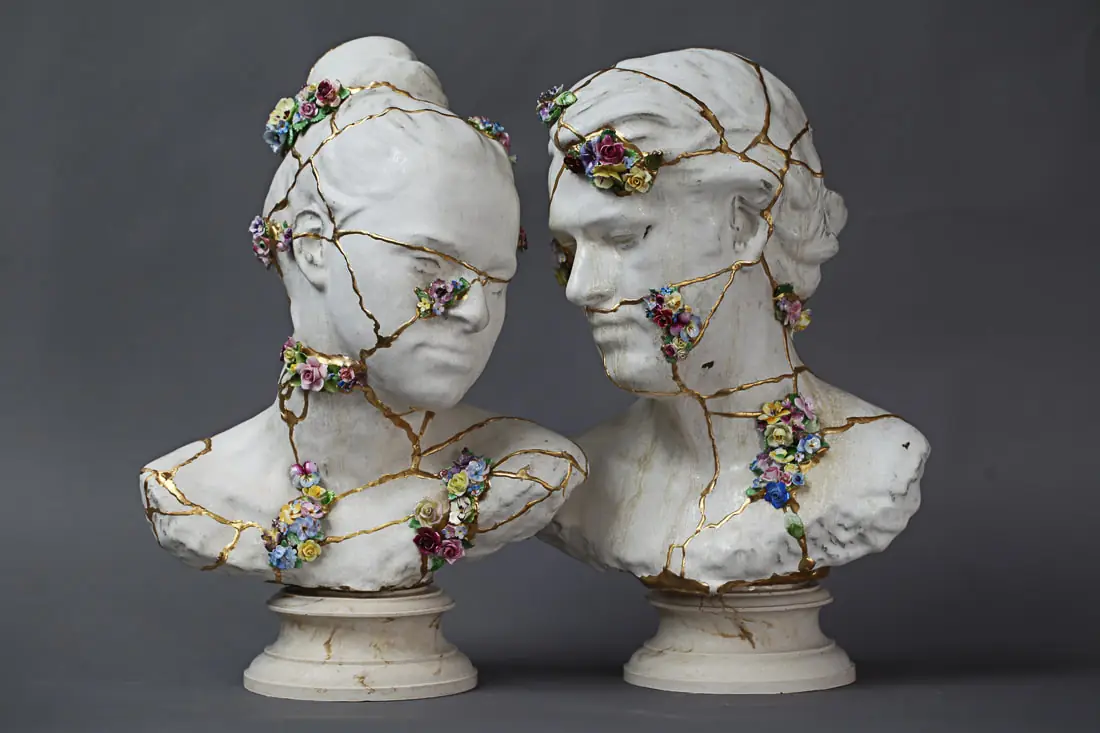| Getting your Trinity Audio player ready... |
Eric Liddell is known as a missionary and sprinter for the Lord. He was born in 1902, in China to missionary parents. He studied in a boarding school and soon became a successful sprinter specializing in the 100-meter dash.

In 1924, when he was given an opportunity to participate in the 100-meter race in the Paris Olympics, he discovered the race was scheduled for a Sunday. He refused to run. Instead, he went to church. Many criticized him. It was hard and uncomfortable. However Eric refused to compromise. He chose to stand for his convictions.
Only Christ-like disciples can impact this generation. An essential quality in a Christ-like disciple is a life of intimacy with Jesus that reflects the Lord’s character even in our interpersonal relationships. Certainly, this contributes to the credibility of the message we proclaim and adds to the health of the Church.
The Bible reveals God as an unchanging God. His loving-kindness and faithfulness never change. He is the God of integrity. He requires that those who have committed to serve him maintain their integrity. Integrity is a quality or state of being complete or undivided. It means being the same inside and out. No double standards.
What is Integrity?
The term integrity includes the idea of an integer in mathematics. It means a whole number, not one number and part of another number. We are considered to be whole when our beliefs are integrated into our behaviour.

A person of integrity is not fractionalized with duplicity or hypocrisy. People of integrity begin a job and finish it. If they make a promise they keep it. If they commit a mistake they admit it. They are whole and complete. God wants us to be whole.
“The heart is deceitful above all things and beyond cure. Who can understand it? I the Lord search the mind to reward a man according to his conduct, according to what his deeds deserve.”1
As we face crisis after crisis, how do we engage in mission with integrity? For instance, the Covid–19 pandemic was a tsunami which affected almost every sphere of society. It was a crisis of unparalleled proportions. The paradoxical terms ‘the new normal’ emerged from it. The enormous needs we faced led to frenzied activity.
Integrity and Mission
The traditional understanding of mission as an activity is severely restricted and challenged on many fronts. The Bible always emphasizes mission as our life rather than an activity to be done. This does not negate the importance of relevant and need based activities springing out of our relationship with God.
The call of Abraham, choosing the nation of Israel and the Church should be understood in the context of election-ethical living – mission. God has called us (elected us) to live ethical lives. The basis of ethical life is God’s word. As we do so we are engaged in a mission. The way we live is an affirmation of what we do.
Christopher Wright in his book, The Mission of God has defined mission as our committed participation as God’s people, at God’s invitation and command, in God’s own mission within the history of God’s world for the redemption of God’s creation.”2 Mission activities are always challenging and exciting; however the basis of such engagement should be from our identity as God’s people and should be an overflow of our walk with God.
For a disciple, challenges are opportunities to glorify God. Even as we go through a season of global pandemic or climate catastrophe, it is a life of integrity that will propel us to reveal to the world the love and hope of the Kingdom. A quick glimpse of some of God’s people in the Word will help us see the importance of this truth.
The Integrity of Noah
Noah is described as a person of integrity.3 He was righteous and blameless in his generation. God chose him as an instrument of his redemption when he decided to judge humankind for its wickedness. The term blameless is not sinless perfection but it refers to the person who is exceptionally obedient to God. These attributes were in him because he walked with God.4 Is our walk with God, reflected in our life of integrity to those around us? Rather than being mystical God is calling us to be practical people who reflect our commitment to walk the talk.
The Integrity of Samuel
The last judge of Israel testifies before the people,
“Here I stand. Testify against me in the presence of the Lord and his anointed. Whose ox have I taken? Whose donkey have I taken? Whom have I cheated? Whom have I oppressed? From whose hand have I accepted a bribe to make me shut my eyes? If I have done any of these things, I will make it right.”5
The passage reveals that Samuel had already determined that he would never compromise on his beliefs and use his position to manipulate or cheat people whom he was called to serve. As a result people respected him. A person of integrity draws respect from the people. It is sad to see celebrity figures with no accountability structures around them.
Unfortunately the ‘baba culture’ (the tendency to assume the role of ‘god man’ rather than a servant leader) has crept into ministry and is fast gaining popularity. Importance is given to quick visibility rather than faithful obscurity. Let us never forget that we represent Christ. In no way should we dishonor the name of our Lord and become stumbling blocks to those in search of the truth.
The Integrity of David
When we think of David the first thing that often comes to our mind is that he committed gross sins. What does the scripture say about this Israelite King? Psalm 78, verse 72 states,
“… And David shepherded them with integrity of heart; with skillful hands he led them.”
This is not to say that the Bible portrays its characters as flawless heroes. Instead, the Bible talks of flawed people who were restored by the grace of God.
Psalm 78 is a historical Psalm. Verse 70 says, “God chose David his servant….” God chooses. From where? “… from tending sheep … he [God] brought him [David] …”6 Many a times we are eagerly waiting for a dramatic future. We might feel the routine of ordinary life mundane but it is the crucible in which we are prepared for the future.
Apostle Paul in his letter to the believers at Colosse writes,
“Whatever you do, work at it with all your heart, as working for the Lord, not for human masters, since you know that you will receive an inheritance from the Lord as a reward. It is the Lord Christ you are serving.”7
A classic example is that of Brother Lawrence who served in a Carmelite monastery in Paris. During his time as a friar he was much preoccupied with cultivating a keen sensitivity to the presence of God in everyday life. This was not done in isolation but as he peeled potatoes and cleaned the cutlery of the monastery. He cultivated intimacy with the Lord he loved and reflected integrity in the work he was entrusted with. This was recorded in a book compiled after his death, “The Practice of the Presence of God.”
Psalm 78, verse 72 talks about King David shepherding God’s people with integrity of heart and skillful hands. Was his integrity seen only after he became a King? Was he a man of integrity even as a shepherd? David tended his father’s sheep. How did he do it? He was responsible, accountable, and willing to risk his life for his sheep.8 He displayed integrity in his work.
When Prophet Nathan confronted David about his sin with Bathsheba and murder of her husband Uriah, David said, “I have sinned against the Lord.”9 In other words, I have compartmentalized my life and separated what I believe from what I have done. He repents and prays, “Create in me a pure heart O God and renew a steadfast spirit within me.”10 People of integrity admit their mistakes and acknowledge their need for God’s help in their lives.

Kintsugi is a Japanese art of repairing broken pottery with gold, silver, or platinum. It could be seen as a metaphor for the way God makes us whole.
Another example we see in David’s life is the way he spared King Saul’s life. He believed that Saul was God’s chosen King and he lived out his belief by sparing Saul’s life even when he had an opportunity to kill him. He waited for God’s timing without compromising his actions in the light of his beliefs.
Today we see tragic examples of God’s people pursuing short cuts, willing to compromise with their beliefs, fractionalizing their life just for selfish temporal gains, and in the process lose what is eternal.
The Integrity of Nehemiah
Nehemiah and Ezra emerged as leaders among Jews who returned to Canaan after their exile in Babylon. God used them restore Judah. While Ezra initiated religious reforms to return the people back to the law and the covenant, Nehemiah rebuilt the broken walls of Jerusalem to preserve the identity of the community.
Nehemiah served as the governor of Jerusalem for two terms. Nehemiah’s challenge was to build trust. He was committed to integrity, to doing the right things for the right reason even when he was not accountable to anyone. He gained trust because of his integrity. A person of integrity is trusted.
“But the earlier governors – those preceding me – placed a heavy burden on the people and took forty shekels of silver from them in addition to food and wine. Their assistants also lorded it over the people. But out of reverence for God I did not act like that.”11
He avoided misuse of his office for his personal gain. An exemplary example of integrity! An interesting observation is that Nehemiah’s integrity sprang from his reverence for God. Today for many leaders reverence for God is only a truth to be expounded from the pulpit rather than something to be exhibited in their life.
The Integrity of Daniel
In Daniel chapter 6 we see that Daniel’s work and character were beyond reproach. When the new King Darius decided to appoint 120 governors with administrators overseeing them, Daniel was being considered to be appointed as the chief administrator. This led to jealousy among the other administrators which led them to plot Daniel’s downfall. They carefully searched for something to accuse him of but failed because he was neither dishonest nor negligent. What a testimony!
Daniel’s life is an example of how ethical behaviour and right choices at every stage of his life helped him in not compromising his integrity in times of crisis. “Whoever walks in integrity walks securely, but whoever takes crooked paths will be found out.”12 To be people of integrity, we should commit ourselves to a few core values. It is these values that will guide our choice, decision, and actions.
Integrity is a matter of heart. Cultivating Integrity in our lives God is watching our hearts. “Above all else guard your heart, for it is the wellspring of life.” The Message Bible renders this as, “Keep vigilant watch over your heart that is where life starts.” Integrity and character are built intentionally by consistently making the right choices again and again until they become a part of your nature.
Conclusion
The Lord Jesus promised the Holy Spirit to his disciples. “But you will receive power when the Holy Spirit comes on you; and you will be my witnesses in Jerusalem, and in all Judea and Samaria, and to the ends of the earth.”13 The power of the Holy Spirit is to transform our lives—not merely to add power to our words. When our lives are transformed, we become witnesses to the Gospel. Words backed by a life of integrity are bound to transform lives.
The truth remains—we are saved by grace. Grace is not a license to sin. Grace carries with it responsibility—the responsibility to practice the spiritual disciplines of prayer, meditation on the Scriptures, and fellowship. We practice these by the power of the Holy Spirit. Our constant clinging to the cross – appropriating the love and forgiveness offered to us through the finished work of Christ – will help us to overcome our sinful tendencies, the ways of the sinful world, and the schemes of the evil one. If we don’t, the gap between the beliefs we hold and the life we live is bound to increase, leading to a loss of integrity.
Today the world is impressed by charisma but God is looking foremost for character. It is necessary for the Gospel to renew us on a daily basis before we engage in the work of renewal. Abraham Lincoln, one of America’s most respected Presidents said, “I am not bound to win, but I am bound to be true. I am not bound to succeed, but I am bound to live up to what light I have.”
This is a season for deep introspection for the body of Christ. The one word that must aptly define us as God’s person is integrity. It is a life of sincerity with no deception or masks. Integrity is not about what we have but what we are.
A scene from the movie Chariots of Fire — a 1981 historical sports drama film based on the life of Eric Liddell. It was directed by Hugh Hudson.
When Eric Liddell chose to be a person of integrity in his choice to forgo an event for which he was prepared, God honoured him. He was allowed to compete in another event for which he was not prepared. Yet he won the race and the gold medal. “The integrity of the upright guides them, but the unfaithful are destroyed by their duplicity.”14
Dr. Laji Paul is the Working President of The Indian Pentecostal Church of God Northern Region. The writer acknowledges the use of a select bibliography in compiling this article.
NOTES
- Jer 17:9, 10. ↩︎
- Wright 23. ↩︎
- Gen 6:9. ↩︎
- Gen 6:9. ↩︎
- 1 Samuel 12:3. ↩︎
- Psalm 78:71. ↩︎
- Col 3:23 and 24. ↩︎
- 1 Samuel 17:34 to 37. A good shepherd is ready to lay down his life for the sheep (John 10:14-15). ↩︎
- 1 Samuel 12:1-15. ↩︎
- Psalm 51:10. ↩︎
- Nehemiah 5:15. ↩︎
- Proverbs 10:9. ↩︎
- Acts 1:8. ↩︎
- Proverbs 11:3. ↩︎
![]()

